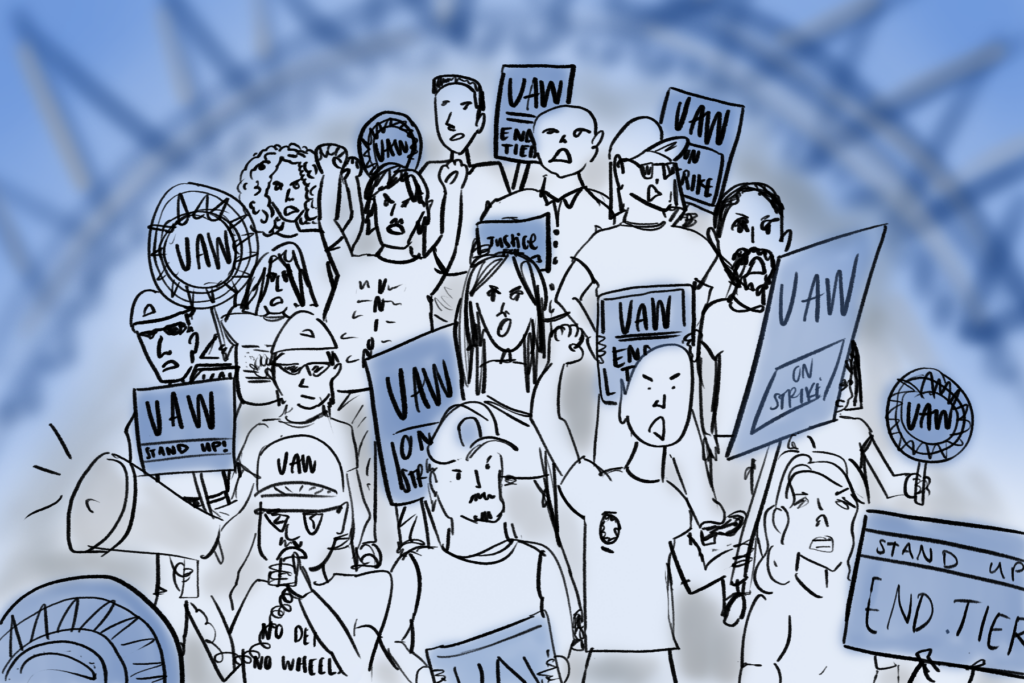
Hayley Powers / Visuals Editor
Presidential election politics have started in the United States, with President Joe Biden and former President Donald Trump making separate visits to Michigan last week in light of the United Auto Workers (UAW) strike. The strike, which started on Sept. 13 with 13,000 workers walking out of Ford, General Motors and Stellantis plants, has expanded to include over 25,000 workers across 20 states.
Biden, the self-proclaimed “most pro-union President in history,” walked the picket line with UAW workers on Sept. 26, endorsed a UAW pay increase and voiced his support for the strike. Workers have four main demands: a 40% pay raise (automakers are offering 20%), reinstating cost of living protections, significantly shortening the wage progression scheme and adding protections to ensure job security in light of the electric vehicle (EV) transition. In short, these demands aim to raise wages, protect those wages against inflation and equalize wages across experience levels.
Auto workers have apt reasons to strike. In 2007 and 2008, workers gave up significant protections, including a freeze in base wages and automatic cost of living adjustments, to keep automakers in business. This stunted auto workers’ wage growth and protections. Adjusted for inflation, their wages dropped over 20% in the past 20 years, while automakers have seen record profits following COVID-19. Additionally, the closure of a Stellantis plant in Belvidere, Ill. has stoked fears of similar closures across the country.
Despite these conditions’ merits, UAW is asking for too much and for wrong concessions, and Biden is making a mistake by fully embracing the workers’ demands. Instead, the UAW must compromise and focus on future issues, and Biden needs to recognize and address the intersectionality between the strike and the EV transition.
I am neither anti-workers’ rights nor anti-union. There is simply too much nuance involved in this strike to take Biden’s stance in equating a pro-union position with only supporting workers’ demands. Rather, a pro-union position is recognizing the automakers’ precarious position and understanding that asking automakers for too much could cost workers their jobs. The world and the auto industry do not look like they did in 2007 and 2008. The transition to EVs is happening, and facilitating that transition costs money for automakers — especially if they intend to make EVs accessible to a large consumer base. If Biden truly is “the most pro-union president in history,” then he needs to use federal support to help facilitate a unionized EV transition, not facilitate an EV transition and force automakers to unionize it.
While automakers’ profits are at record highs, corporations and their profits are being squeezed on all sides due to state policies and federal goals driving the EV transition, growing domestic and international competition in the EV industry and needing to increase workers’ pay. For example, Ford recently paused construction of a new EV battery plant in Michigan, citing uncertain labor costs.
While you may not be inclined to feel sorrow for the automakers’ conundrum, remember that they are facing a choice between advancing the climate effort, bolstering the U.S. economy and supporting their workers. These are three issues Biden pressured automakers about, yet he fails to recognize the nuance in how these factors interact. Continuing to fully embrace workers’ demands would not only be a detriment to our climate effort and economy in favor of auto workers, but more importantly, it would prevent Biden from advancing not just one but three goals.
To take the unprecedented step of joining the picket line and fully supporting workers’ demands is a mere political move. However, the Biden administration does have tools at its disposal to actually help unions while also supporting automakers.
One of auto workers’ central concerns is auto manufacturing factories closing in favor of new EV plants. In an effort to keep current plants open, Biden has offered $15.5 billion in funding for transitioning current factories to EV production. This funding, which companies can apply for, specifies that high-paying companies with unionized labor will be favored in the application process. However, just $2 billion dollars of this funding is grants, with $10 billion in loans. This means automakers will be on the hook for all but $2 billion dollars of federal funding. Considering that companies announced more than $73 billion in spending for planned EV and battery plants in 2022, $2 billion in grant funding is nowhere near enough to keep unionized automakers competitive. If Biden is going to put unprecedented pressure on automakers, he needs to take unprecedented steps in supporting unions by significantly funding union protection through a transition that he is facilitating.
The Biden administration is not the only short-sighted party in this conversation. UAW is falling victim to a trend that has plagued the labor movement for decades: Strike demands based on the problems of today neglect how major industry transitions will affect workers. UAW leaders point to a recent Teamsters union deal, which raised United Parcel Service (UPS) workers’ wages, as a blueprint for their strike.
However, this deal fails to protect workers as UPS transitions to a self-driving fleet. It does not matter if UPS drivers are paid more when there won’t be UPS drivers in the coming decades. The same is true with UAW. In an effort to protect workers during the EV transition, UAW wants the guaranteed right to strike and compensation in the event of a plant closure. This adversarial perspective is the wrong approach for the union. It takes fewer workers to make electric vehicles, meaning job transitions are inevitable. Rather than actively fighting against plant closures or job losses, the union needs to understand that worker transitions are unavoidable as well as work with companies to secure the best future for their workers. To do this, UAW should ensure guaranteed job offers at EV battery plants for displaced workers. UAW should also fight for guaranteed retraining programs and relocation assistance for workers who need to move. This strike could be the best way for them to set up an optimal future for their workers — but that is only possible if they cease their unrealistic approach.
This is not to say that UAW should not focus on wages: Workers deserve to get paid their fair share. But a 40% wage increase, elimination of the tiered wage system and an increase in benefits is simply too much for workers to ask, especially without more federal support. A combination of compromise and federal funding could give workers what they deserve without putting auto manufacturers out of business.
The UAW should be on strike and Biden might be the most pro-union president in recent history, but both sides need to change their strategies in order to get the most out of their demands in this strike. Given the national attention they currently have, addressing the issues of the future needs to be UAW’s priority. If successful, it could represent a major turning point in the future for unions and our EV transition. Otherwise, it will only pinch automakers, hurting workers and every one of us.
Pierce McDade (25Ox) is from Bloomington, IL.
Pierce McDade (he/him, 25Ox) is from Bloomington, Illinois, majoring in Political Science and Economics on the pre-law track. Outside of the Wheel, Pierce is a first year senator in Oxford SGA and an Admissions Ambassador in the Oxford Student Admission Association. In his free time, Pierce enjoys thrifting, playing Pickleball, and hanging out with friends.




